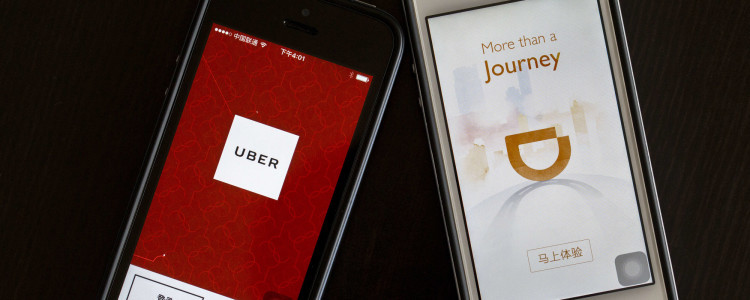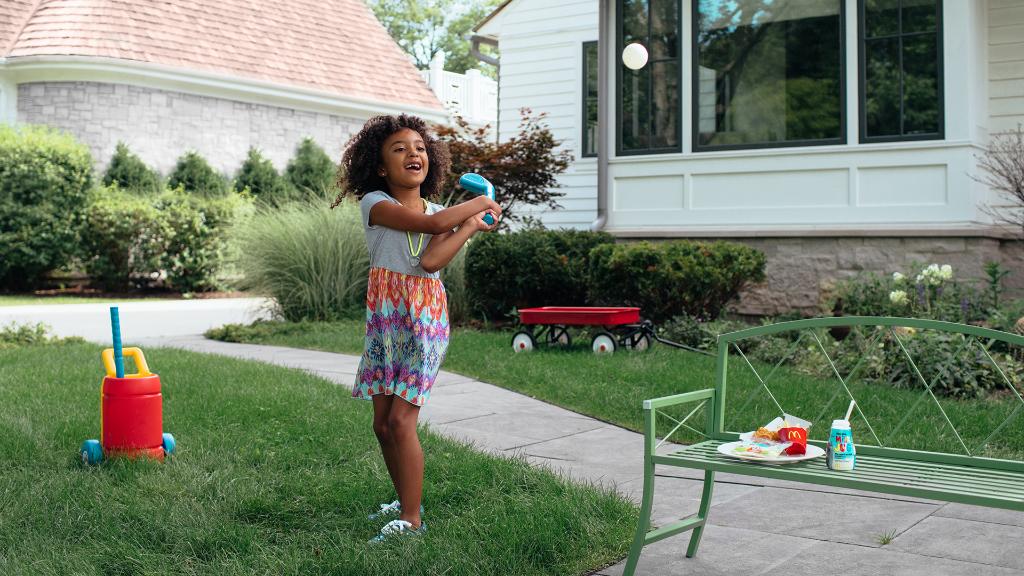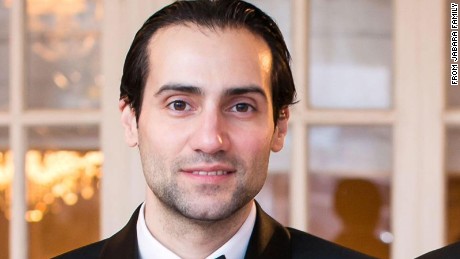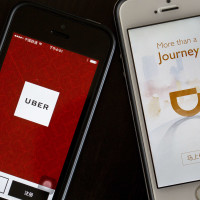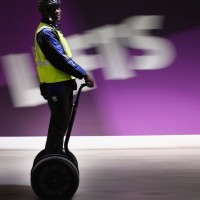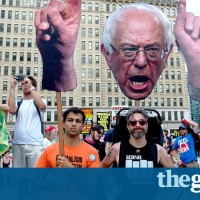When Uber sold its China operations to its Chinese competitor Didi Chuxing earlier this month, Silicon Valley’s latest hope for conquering the Chinese market bit the dust. The Valley’s leading tech juggernauts have, one by one, lost the battle for China’s 700 million internet users, falling victim both to Chinese censors (in the case of Google, Facebook and Twitter, among others) and local competitors (in the case of Amazon, eBay and Uber).
At the same time, China’s own tech titans Alibaba, Baidu and Tencent have seen little progress in their attempts to gain traction internationally. Despite a stranglehold on Chinese markets and some innovative apps that Western firms now look to imitate global consumers have yet to truly embrace Chinese tech companies.
Instead of direct competition, Chinese and Western internet companies are increasingly turning toward partnerships and reciprocal investments. As these firms exit each other’s markets and opt for cooperation rather than competition, some analysts describe the global internet being carved into “spheres of influence.”
For insight into trans-Pacific tech rivalries and relationships, The WorldPost spoke with Li Zhifei, founder and CEO of Mobvoi, a Beijing-based artificial intelligence startup that in many ways bridges Beijing and Silicon Valley. Li worked as a research scientist at Google before returning to Beijing to found his own company. Mobvoi has since taken on investment from Google and served as the company’s proxy for bringing Android Wear to China, where Google services are blocked. Mobvoi is now marketing own smartwatch, Ticwatch 2, to international consumers through a Kickstarter campaign that has raised almost $1.5 million.
Li spoke with The WorldPost about innovation ecosystem in Silicon Valley and Beijing, and why Chinese and U.S. tech companies can’t seem to crack each other’s markets.
You’ve spent time as a research scientist at Google in Silicon Valley and now founding Mobvoi in Beijing. How would you compare the innovation ecosystem between these two places?
I would argue that Beijing has caught up with Silicon Valley really quickly. If you think about two or three years ago there was still quite a difference in terms of business models and talent. I think right now Beijing is really close to Silicon Valley in many aspects, and in some ways Beijing might be ahead.
Beijing has caught up with Silicon Valley really quickly.
In terms of talent, those really good people really motivated, smart, well-educated and professional I think Silicon Valley is still much better than Beijing. But it’s a process. I would argue that Beijing is catching up because all those things can be trained, as long as you’re facing real problems. Right now companies like Didi and Xiaomi have tough problems, and commercializing is very important. They gradually become better and better because they face real problems, and if they solve the problem they get real returns.
If you think about the VC money, I think Beijing is comparable to Silicon Valley and sometimes the market size might actually be bigger. It’s much easier for you to attract 1 or 2 million users just in Beijing. That’s the benefit of China.
But Silicon Valley certainly has a lot of advantages. If you’re a company in Silicon Valley, from day one you’re a global company. When the world looks at Beijing and Silicon Valley, they always think Silicon Valley really represents the global values of human society, while Beijing is seen as China-specific. Especially in the Western world, I think there still exists bias towards the Chinese system. From that sense I think Silicon Valley companies still have an advantage: from day one they can go global, they have a global brand.
Recently Uber sold its China operations to Didi, and we’ve seen lots of new partnerships between companies in the two ecosystems. What’s driving this trend of increasing cooperation and partnerships between Silicon Valley and Beijing?
I think absolutely the relationship between Beijing and Silicon Valley is going to be much tighter, and there will be a lot more interaction. The real motivation is commercial the business side. I remember in 2010 when Google withdrew from China, their revenue from China might have just been 1 percent of their global revenue. That’s really nothing.
The relationship between Beijing and Silicon Valley is going to be much tighter.
But if you think about how mobile has changed in the last three or four years, the Chinese mobile phone market is now the largest in the world, I think around 20 percent globally. That means as long as you’re a global company and you care about that 20 percent of the market, then you’ve got to either operate here locally or have a good partner in China.
On the other hand, Chinese companies also want to go global. Now companies here are confident: they have money, they have people, they have the market share and they also have a global view. That’s why you’re seeing so much foreign investment by Chinese tech companies in Silicon Valley and Europe.
Given that desire to access China, what are the main obstacles other than outright government blocking of sites that U.S. tech companies face in China?
I think for U.S. companies coming to China, if your company is more operational if it’s really not about technology those companies really don’t have a lot of competitive advantages here. It’s more about local operations, speed of action, competition in fundraising. For funding or speed of operations, I think local Chinese companies are really, really strong. That’s exactly why a company like Uber has a really tough war here. Didi is so aggressive in terms of raising money, speed of execution, growth, etc. You have to make quick decisions, quick reactions to changes in the market, and if your headquarters is in the U.S. it’s going to be difficult.
But I think for technology companies it might be a little different. If it’s really technology-driven and it’s actually at the frontier, those companies still have an advantage when they come to China. But for the operations, they still need to have some really localized operation teams. I think Silicon Valley companies have a really global view, but they need local action.

When talking about your own company’s move into international markets, you’ve said, “We’re not going to emphasize that we’re a Chinese company, but we’re not going to hide it either.” What do you think are the obstacles for Chinese companies as they go global?
Chinese companies are much more confident now in terms of the technology, the speed we can execute, how hard we can work on the problem. But we certainly face problems in the way the Western world thinks about Chinese companies: they don’t have real technology, they don’t have innovation, they produce cheap products, they are not trustworthy. I think those ideas are still in the minds of most Western people, and those are real obstacles we’re going to face.
But for me and for many Chinese technology companies, if you want to go overseas, I think you really have to focus on the product and the user itself. As long as you have a really, really good product, when users are purchasing the product they won’t be worried if you’re from China or from Russia. If you don’t have a good product or user experience you have zero chance of being successful in the U.S. Once you have this, you might have a chance, as long as you’re patient.
Our mission is to define the next generation of human-computer interaction by using AI technology.
Your international Kickstarter campaign for the Ticwatch 2 has already raised over a million dollars. Why did you choose to launch Ticwatch 2 on global markets, and what will it be like entering into the global marketplace?
For Mobvoi, we want to be a global company, and we want to be a technologically innovative company. Our mission is to define the next generation of human-computer interaction by using AI technology. I think this is really something new; it’s a mission that hasn’t been fulfilled by anyone in the U.S. or any other country.
We really want to collect feedback globally. If you get a global view of the market and you get a lot of feedback from all kinds of places, it will actually change the way you think about the problem and address it.
We’re pretty confident that our product is competitive. In China we face the exact same competition: Apple, Huawei, Samsung, Moto 360. They all have products here [in China], so when we go overseas it’s the exact same competition we’re facing. In China we’re doing very well when compared with those big brands.
The Western market for this new emerging category is really interested in seeing a new brand, a new way of doing the smartwatch. I think our way of doing the smartwatch is really different: we do the algorithm, operating system and hardware all by ourselves, so it’s an entirely integrated product and its highly optimized. I think we’re going to bring something new and unique to the smartwatch market.
This interview has been edited and condensed for clarity.
Read more: http://www.huffingtonpost.com/entry/tech-entrepreneur-china_us_57b38513e4b0b42c38af18ac?section=&
